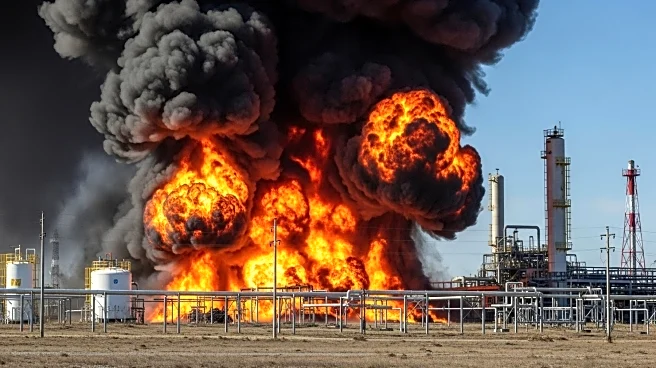What's Happening?
Ukraine has reportedly targeted the Korobkovsky Gas Processing Plant, one of Russia's largest gas facilities, as part of ongoing hostilities between the two nations. The attack also included an oil transportation station in Yefimovka, leading to explosions and fires at both sites. This development is part of a broader energy conflict as both countries aim to undermine each other's domestic gas production capabilities ahead of the winter months. The Kremlin has acknowledged challenges in gas supply and is taking measures to address the situation. Meanwhile, Ukraine faces significant setbacks, with Russian strikes reportedly eliminating 60% of its gas production, necessitating $2.2 billion in fuel imports for the winter.
Why It's Important?
The energy war between Russia and Ukraine has significant implications for both countries and the broader region. For Ukraine, the destruction of its gas production facilities means increased reliance on costly imports, which could strain its economy and affect its citizens during the harsh winter. For Russia, the attacks on its infrastructure could exacerbate existing fuel shortages, impacting domestic consumption and potentially leading to political pressure on the Kremlin. The conflict also highlights the vulnerability of energy infrastructure in wartime, with potential ripple effects on global energy markets and geopolitical stability.
What's Next?
As the winter months approach, both Russia and Ukraine are likely to intensify efforts to secure energy supplies and mitigate the impact of infrastructure damage. Ukraine may seek further international assistance to cover its fuel import needs, while Russia might implement additional measures to stabilize its domestic gas supply. The ongoing energy conflict could lead to heightened tensions and further military engagements, with potential diplomatic interventions from international stakeholders aiming to de-escalate the situation.
Beyond the Headlines
The energy conflict between Russia and Ukraine underscores the strategic importance of energy resources in geopolitical conflicts. It raises ethical questions about targeting civilian infrastructure and the humanitarian impact of energy shortages during winter. Long-term, this situation could prompt both countries to invest in more resilient energy systems and diversify their energy sources to reduce dependency on vulnerable infrastructure.









